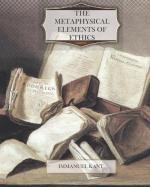3. Virtue (like prudence) must be learned from experience.
XIV. Of Virtue in General
{Introduction ^paragraph 175}
Virtue signifies a moral strength of will. But this does not exhaust the notion; for such strength might also belong to a holy (superhuman) being, in whom no opposing impulse counteracts the law of his rational will; who therefore willingly does everything in accordance with the law. Virtue then is the moral strength of a man’s will in his obedience to duty; and this is a moral necessitation by his own law giving reason, inasmuch as this constitutes itself a power executing the law. It is not itself a duty, nor is it a duty to possess it (otherwise we should be in duty bound to have a duty), but it commands, and accompanies its command with a moral constraint (one possible by laws of internal freedom). But since this should be irresistible, strength is requisite, and the degree of this strength can be estimated only by the magnitude of the hindrances which man creates for himself, by his inclinations. Vices, the brood of unlawful dispositions, are the monsters that he has to combat; wherefore this moral strength as fortitude (fortitudo moral is) constitutes the greatest and only true martial glory of man; it is also called the true wisdom, namely, the practical, because it makes the ultimate end of the existence of man on earth its own end. Its possession alone makes man free, healthy, rich, a king, etc., nor either chance or fate deprive him of this, since he possesses himself, and the virtuous cannot lose his virtue.
All the encomiums bestowed on the ideal of humanity in its moral perfection can lose nothing of their practical reality by the examples of what men now are, have been, or will probably be hereafter; anthropology which proceeds from mere empirical knowledge cannot impair anthroponomy which is erected by the unconditionally legislating reason; and although virtue may now and then be called meritorious (in relation to men, not to the law), and be worthy of reward, yet in itself, as it is its own end, so also it must be regarded as its own reward.
Virtue considered in its complete perfection is, therefore, regarded not as if man possessed virtue, but as if virtue possessed the man, since in the former case it would appear as though he had still had the choice (for which he would then require another virtue, in order to select virtue from all other wares offered to him). To conceive a plurality of virtues (as we unavoidably must) is nothing else but to conceive various moral objects to which the (rational) will is led by the single principle of virtue; and it is the same with the opposite vices. The expression which personifies both is a contrivance for affecting the sensibility, pointing, however, to a moral sense. Hence it follows that an aesthetic of morals is not a part, but a subjective exposition of the Metaphysic of Morals; in which the emotions that accompany the force of the moral law make the that force to be felt; for example: disgust, horror, etc., which gives a sensible moral aversion in order to gain the precedence from the merely sensible incitement.




